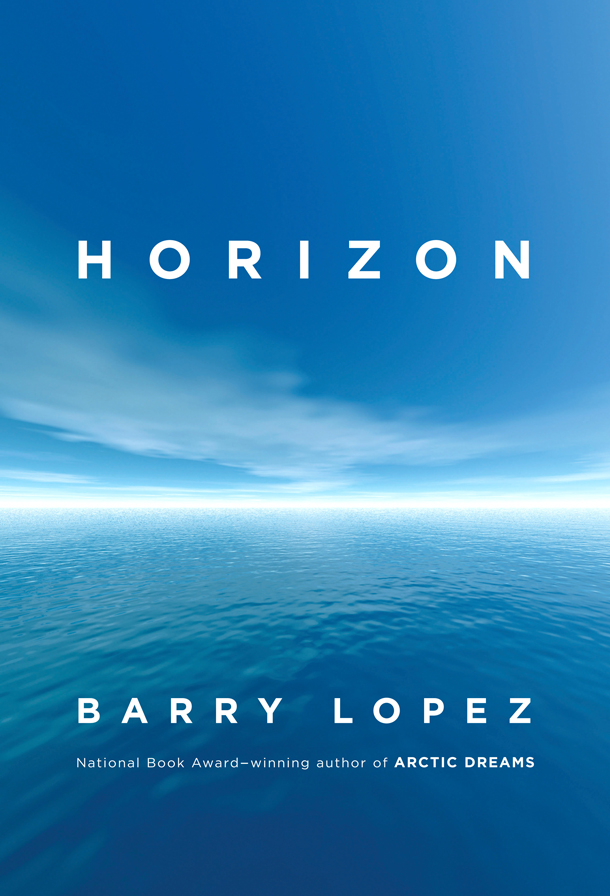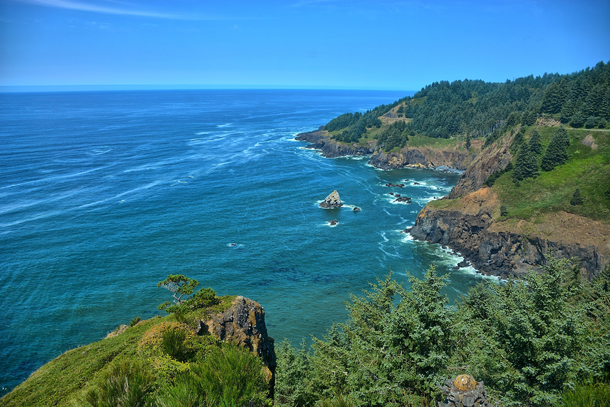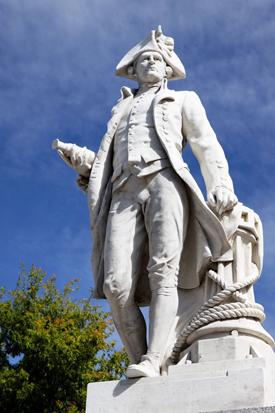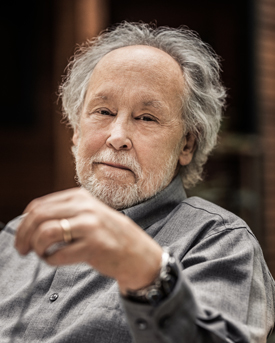Horizon by Barry Lopez
Air Date: Week of June 14, 2019

Horizon is a work more than 30 years in the making. (Image: courtesy of Alfred A. Knopf, Inc.)
The author of National Book Award-winning Arctic Dreams took around 30 years to write his latest book, Horizon. It’s a sweeping account of his lifetime of traveling the world and seeking the perspectives of diverse cultures. In his quest to understand the human race’s current predicament, Mr. Lopez asks: “Who is our navigator?” in this time of climate change and pervasive inequality. Barry Lopez speaks with Host Steve Curwood about the importance of acknowledging “the horrors” of our past and present, and striving towards a more humane and hopeful future.
Transcript
CURWOOD: It’s Living on Earth, I’m Steve Curwood.
Back in 1986, writer Barry Lopez won the National Book Award for his volume Arctic Dreams. He is a prolific nature and environmental writer, with critical acclaim for his other works including Of Wolves and Men. But, as time went on, he kept ruminating about a follow up to Arctic Dreams and now, after more than thirty years he’s published Horizon. It’s an expansive book full of reflections on his travels all over the world, with a focus on the current need for humanity to navigate through these treacherous times. Barry Lopez joins me from Seattle. Welcome to Living on Earth!
LOPEZ: Thanks, Steve, glad to be here.
CURWOOD: So this is a simple and yet huge question: why did you write this book, Horizon?
LOPEZ: I have made a life out of going away from my home. And sojourning in other places, Antarctica or Afghanistan, and on and on. And while I was doing that, and writing articles about those places, I was asking myself the question, why are you doing this? Are you just running away? Or have you actually accomplished something in all these years of travel? So I think that was the trigger for the book. What had I done as a writer? That incubated inside of me; when I signed the contract in 1989, everybody at Knopf basically gave me their blessing, and they said, "when you are ready, bring this book to us. Nobody's going to ask you about, 'what'd you do with that advance?'." [LAUGHS]
CURWOOD: [LAUGHS]
LOPEZ: So between signing the contract about 30 years ago, and writing the book, I wrote five or six other books and wrote a lot for magazines. But I had to get myself educated, I had to mature as a human being. And once I felt, roughly in my late 60s, that I could understand what the book was supposed to be about, then I started writing it. But it incubated, Steve, for a very long time.
CURWOOD: Of course, your book is an elegant song of praise to the interactions between people and place —
LOPEZ: Yes.
CURWOOD: — and you dwell on your own relationship with a recently clear-cut patch of forest in Cape Foulweather, Oregon –
LOPEZ: Right.
CURWOOD: So, so tell me why you started your practice of visiting this clearcut, and why it became meaningful to you.

Barry Lopez opens Horizon with a scene at Cape Foulweather, Oregon, where he muses on the legacy of Captain James Cook and another heroic, but unheard of, navigator named Ranald MacDonald. (Photo: Kirt Edblom, Flickr CC BY-SA 2.0)
LOPEZ: I had for most of my adult life been intrigued with James Cook, and what he was up to, what he was about. And so I would read biographies and make notes and was going in no particular direction with that impulse. But I did know that, on his third voyage, he sighted North America and his landfall was at Cape Foulweather; they got there in a horrendous storm, and so he named the cape for the weather. And I thought, well I'll, I'll learn something, if I go over there and just sit quietly. So I went on these back roads, logging roads, and got some elevation, and camped in a clearcut where I could see, straight out in front of me, the Pacific. And I guess I went there 10 or 12 times and would camp there for a while. I didn't have an agenda. But I had tremendous curiosity about what this anonymous, and anomalous, place was. You know, I made a catalog of the plants and the birds, and was there in all kinds of weather. And to open the book, to open Horizon, I chose to go when a really big storm was moving in. I knew this storm was coming out of the Gulf of Alaska, and I thought, I'm going to go out to Cape Foulweather and, and weather the storm out there, just to get a little bit of a feeling of those few days when he was inside of Cape Foulweather. It was also a way for me to present a man named Ranald McDonald, who was born at the mouth of the Columbia River, he had a Chinook mother and a Scots father. And he didn't get the breaks in life that James Cook did, because he was mixed race. He was told in a very direct way that a person of mixed race like him had no business trying to approach or date a white woman. And he became the character for me that stood for modern times. We live in a mixed race culture, there's a mix of ideas, and the character of James Cook, although laudable, wasn't the full story. The world is full of characters like Ranald McDonald, who are heroic, but unheralded.
CURWOOD: You know, I view this part of your book as a fascinating take on, excuse the phrase, the 'great white hunter' phenomenon.
LOPEZ: Yes.
CURWOOD: And a commentary about, so who gets to make all these decisions about exploration? Who tells the story when you get there? And how do you, how do you get credit and support for doing something unusual like this, if, if, in fact, you are the guy that actually finds the game for the 'great white hunter'.
LOPEZ: I wanted, in this book, to set in motion the questions that you have just phrased. And throughout the book, I'm posing, I think, two questions that arise with Cook. And that is, all of us know hell is coming. You can call it global climate change, you can call it the disintegration of democratic forms of government, you can go anywhere and say, "this doesn't look good, this looks really bad". So the need to attack this issue, to me, is like one of the great voyages that we now have to choose to make: move into unknown territory, uncharted lands. So our model for that is this fellow Cook, and his ship. And my hope in the book is that people will say, we're in trouble. What is going to be the vessel on which we sail? And, maybe more importantly, who is going to be the navigator? Are the qualifications for a navigator today different than they were in the late 18th century? Oh my, yes. We have atomic weaponry, we have constant warfare, we have failing supplies of fresh water. We need a navigator the like of which we've never seen. So I think if you are doing your job as a writer, first of all has nothing to do with you; as the writer, you're the conduit, through which is coming something that maybe the writer doesn't understand. But it's an effort to put in front of people a vision of the world that allows them who have different expertises to say, "here's what we should do. This is how we take care of ourselves."
CURWOOD: You know, that book title, simply Horizon, there's no subtitle. 30 years ago, you picked it when you signed the contract.

The Captain James Cook statue in Christchurch, New Zealand. (Photo: Roger Wong, Wikimedia Commons CC BY-SA 2.0)
LOPEZ: Right, I did.
CURWOOD: Why? Why did you choose that title?
LOPEZ: The question that you've asked is one I ask myself, why did I choose that word for the title of the book? I had to write the book before I understood why the book is called Horizon. The book early on also had a subtitle, which I decided to get rid of because it was pretentious, and was not earning its place on the cover. I think especially with a big book like this, the process of editing is, in large part, is getting rid of the scaffolding. You set up the scaffolding to create the edifice, and if you want it to be seen in a clean way, you've got to get rid of all of that scaffolding. So the subtitle was a bit of scaffolding. And I looked at it one day and thought, "oh, give me a break."
CURWOOD: [LAUGHS]
LOPEZ: So the, the title and the subtitle were once Horizon: The Autobiography of a Journey. And it is an autobiographical book, and it is about the narrator's trying to grow up, trying to be a real person. And early on in the book, you know, I did something that was completely foolish and humiliating for me to discover in myself, which is a failure to understand that the other people are different from you, and you don't know; they do. And when I did that, I felt, I have to write about this, and I have to expose my vulnerability. And I have to make common cause with every reader who, all of us have done things we regret doing. And then, then you grow up. And so the whole book is about arriving at a position of impassioned embrace of all human beings. People often say to me, "well, you go to these exotic places, what's the key?" As though there was, you know. But the answer to that is, when you are in a place that is not your own, among people who are not like you, the first impulse always has to be respect. Even if you don't understand, you have to show respect for what is technically called another epistemology, another way of knowing the world.
CURWOOD: So to what extent would you say that Horizon tells the story of you discovering the Other?
LOPEZ: You're so good at this, Steve; it is that, I hadn't thought of that. But if you'd let me what I would say – yes, it is a story of the discovery of the Other. But I think it's a plea as well, to everyone to take the same journey, to realize the stakes are so high now that you must make common cause with all people. You could say, we need to rid ourselves of racism, and ethnic warfare, etc, etc. We aren't doing that, we're still living with that horror. But we have to discover a politics, for example, that takes place as though all those things have been accomplished. So you're saying to yourself all the time, "what would it be like, if we didn't have this racist horror drifting through American culture?" And then you have to make a politics that's founded on the fact that we were able to do that. Time is so short; you can sit down with people who make the models for global climate change, and what they all agree on since they started in the late 70s, is, we got some things right. Each time we do this, we get many things right. But the one thing we get wrong consistently, is how fast this is happening. So we have not too much time, and we need calm voices, common cause, compassion, empathy for all people who are in bad straits. And when we fall down, somebody helps us up, we have to be there when somebody else falls, and you help them up. If we can't make that giant leap, everything we pray for in our lives, in our different religions, is going to come to nothing.
CURWOOD: Your book is both searing in its indictment of the way we're conducting things, and our plight, and hopeful, so hopeful –
LOPEZ: Yes.
CURWOOD: — that somehow we are going to deal with these huge challenges that humanity is facing. Why?

Barry Lopez is the author of Horizon and sixteen other books. (Photo: John Clark)
LOPEZ: Whenever people say something nice about my work, or, or what I've done, I always point out that I had really good teachers. And I mean, I had great teachers in university, and then I went into cultural worlds different from my own, and there too, I had great teachers. They were not of my race, they were not of my religion. They weren't, they didn't speak my language. But these men and women helped me to understand what it means to be a grownup. And, you know, a grownup is somebody who no longer needs to be supervised, they can be left alone, to act on behalf of their people, without the fear that they're going to favor one group, or one age, or one gender over another. One of those people said to me one time, when I expressed doubt about myself and about the direction of the book, he said, "the only thing you can do wrong, is to destroy someone's sense of hope. For you, the sense of hope that they are carrying might be poorly thought out or untenable. But you cannot say that to somebody, you have to support them on their journey to arrive at a hopeful end." So I knew that I had to state in the book some of the terrible episodes that we all have experience with, or at least know about, like the slave trade. And we have to reckon with that. But I knew the book had to end with an elevation of the reader's spirit that was believable. Many of us have become cynical, because of the atmosphere around, if you will, the current occupant of the White House, we've become very cynical about what can be done. And we can't go into that place, we have to maintain a vision that, you know, is on the horizon, of a different way of doing things that is less harmful, less cruel. It's a request, I suppose, for a larger view of things than the horrible moment of the present. And I count on readers to come alive with this book and say, I now understand better what it is I really want for myself or my family or my children.
CURWOOD: And you're an optimist about that.
LOPEZ: There's no good thing that can be said about despair and pessimism. The whole thing is on the line right now, the entire meaning of the evolution of Homo sapiens. We either show that our power of invention is tremendous, or we show that the development of imagination in the hominin line was maladaptive.
CURWOOD: Barry Lopez is the author of the National Book Award-winning Arctic Dreams and his 2019 book is called Horizon. Thank you so much for taking the time with us today.
LOPEZ: Thank you, Steve.
Links
Living on Earth wants to hear from you!
Living on Earth
62 Calef Highway, Suite 212
Lee, NH 03861
Telephone: 617-287-4121
E-mail: comments@loe.org
Newsletter [Click here]
Donate to Living on Earth!
Living on Earth is an independent media program and relies entirely on contributions from listeners and institutions supporting public service. Please donate now to preserve an independent environmental voice.
NewsletterLiving on Earth offers a weekly delivery of the show's rundown to your mailbox. Sign up for our newsletter today!
 Sailors For The Sea: Be the change you want to sea.
Sailors For The Sea: Be the change you want to sea.
 The Grantham Foundation for the Protection of the Environment: Committed to protecting and improving the health of the global environment.
The Grantham Foundation for the Protection of the Environment: Committed to protecting and improving the health of the global environment.
 Contribute to Living on Earth and receive, as our gift to you, an archival print of one of Mark Seth Lender's extraordinary wildlife photographs. Follow the link to see Mark's current collection of photographs.
Contribute to Living on Earth and receive, as our gift to you, an archival print of one of Mark Seth Lender's extraordinary wildlife photographs. Follow the link to see Mark's current collection of photographs.
 Buy a signed copy of Mark Seth Lender's book Smeagull the Seagull & support Living on Earth
Buy a signed copy of Mark Seth Lender's book Smeagull the Seagull & support Living on Earth

